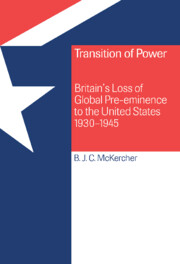Book contents
- Frontmatter
- Contents
- Acknowledgments
- List of abbreviations
- Prologue: Power and purpose in Anglo-American relations, 1919–1929
- 1 The end of Anglo-American naval rivalry, 1929–1930
- 2 The undermining of war debts and reparations, 1929–1932
- 3 Disarmament and security in Europe and the Far East, 1930–1932
- 4 The unravelling of co-operation, 1932–1933
- 5 Moving away from the United States, 1933–1934
- 6 Britain, the United States, and the global balance of power, 1934–1935
- 7 From Abyssinia to Brussels via London, Madrid, and Peking, 1935–1937
- 8 Appeasement, deterrence, and Anglo-American relations, 1938–1939
- 9 Belligerent Britain and the neutral United States, 1939–1941
- Epilogue: ‘A new order of things’, 1941–1945
- Select Bibliography
- Index
Epilogue: ‘A new order of things’, 1941–1945
Published online by Cambridge University Press: 15 July 2009
- Frontmatter
- Contents
- Acknowledgments
- List of abbreviations
- Prologue: Power and purpose in Anglo-American relations, 1919–1929
- 1 The end of Anglo-American naval rivalry, 1929–1930
- 2 The undermining of war debts and reparations, 1929–1932
- 3 Disarmament and security in Europe and the Far East, 1930–1932
- 4 The unravelling of co-operation, 1932–1933
- 5 Moving away from the United States, 1933–1934
- 6 Britain, the United States, and the global balance of power, 1934–1935
- 7 From Abyssinia to Brussels via London, Madrid, and Peking, 1935–1937
- 8 Appeasement, deterrence, and Anglo-American relations, 1938–1939
- 9 Belligerent Britain and the neutral United States, 1939–1941
- Epilogue: ‘A new order of things’, 1941–1945
- Select Bibliography
- Index
Summary
But, unless appearances are deceptive, the United States is also now groping towards a new order of things in which Great Britain, whilst occupying a highly important position as a bastion of Western European security and as the focal point of a far-flung oceanic system, will nevertheless be expected to take her place as junior partner in an orbit of power predominantly under American aegis.
Balfour, August 1945Churchill accepted the heavy economic and political price that American assistance after June 1940 necessitated. For Britain to survive Germany's onslaught, retain its Empire, and seek means to defeat the Axis, the United States had to join the war on Britain's side. Lately, however, the United States’ position in Churchill's wartime grand strategy has been questioned. Building on criticisms of Churchill's diplomacy that emerged as early as 1944, it is argued that Anglo-American alignment – along with British partnership with Bolshevik Russia – eroded Britain's power, squandered its freedom of action in foreign policy, and, thereby, because Britain by 1945 became secondary to the United States (and Russia), destroyed Britain as the greatest of the Great Powers. The most recent critique argues that Britain's interests would have been better served by settling with Germany in either 1940 or, after Hitler turned on Russia, 1941. Hitler and Stalin could then have torn themselves to pieces, Britain would not have become beholden to the United States, and, once the Russo-German war ended, Britain and its Empire would have been intact, with London retaining decided influence in establishing the postwar order.
Yet, as a perceptive response to this fanciful musing demonstrates, and apart from the British public's obvious anti-Germanism, Hitler could not be trusted; despite the German leader wanting to destroy and then colonise Bolshevik Russia, Britain existed as ‘a prime target of Hitler's malevolence’.
- Type
- Chapter
- Information
- Transition of PowerBritain's Loss of Global Pre-eminence to the United States, 1930–1945, pp. 308 - 343Publisher: Cambridge University PressPrint publication year: 1999



